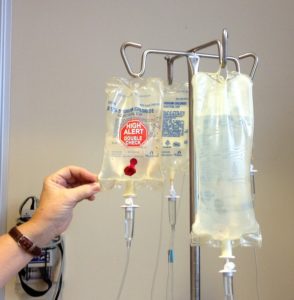
Approval means more patients have access to a potentially life saving drug
Credit: activebrokers.co.uk
For decades, cancer treatments focused on where tumors originated to determine how to treat the disease. But now for the first time, the FDA has approved the immunotherapy drug Keytruda to treat cancers based on genetic biomarkers rather than the location of the disease.
Merck & Co. invented the drug, Keytruda, years ago. It first received FDA approval in 2014, and has since proven effective in the treatment of melanoma, advanced non-small cell lung cancer and non-Hodgkin lymphoma. Like other immunotherapy drugs, it works by blocking a genetic mechanism in tumors that allows them to spread.
Essentially, some tumors have genes in them that trick the immune system. Rather than attacking these tumors as it normally would, the immune system ignores them. As a result, the tumor gets larger and larger. Keytruda and other immunotherapy drugs treat cancer by helping the patient’s own immune system identify these tumors and fight them.
Because Keytruda targets biomarkers, it can successfully treat a variety of different cancers, regardless of where they originated. However, the FDA normally approves drugs based on tumor location. For example, it might approve a drug to treat lung cancer this year and take two more years to approve it as a treatment for breast cancer. By approving Keytruda for any tumor that carries a specific gene, the FDA has made it available to many cancer patients much more quickly.
However, its use will still be limited for now.
Restrictions Still Exist
In order to be eligible for treatment with Keytruda under the new guidelines, patients must meet certain criteria. First, the tumor must have one of two biomarkers: microsatellite instability-high (MSI-H) or mismatch repair deficient (dMMR). In addition, the patient must be ineligible for surgery; have cancer that has spread despite prior therapy; or have no other treatment options available. Patients with colorectal cancer that is spreading after treatment with conventional chemotherapy are eligible as well.
The types of cancer most often associated with MSI-H and dMMR biomarkers are cancers of the breast, prostate, thyroid and bladder. They’re also common in colorectal, endometrial and gastrointestinal cancers, meaning that this treatment could be especially helpful for patients who have these forms of the disease.

Patients still have to undergo other cancer treatments
Despite the restrictions, the FDA has said that it will grant accelerated approval for Keytruda in rare cases. For instance, if a patient’s condition isn’t improving with current treatments and their doctor believes that the drug will have a positive effect, then the FDA might grant approval. Merck & Co. will also conduct additional studies to prove that the benefit will likely occur.
As of now, the FDA doesn’t plan to expand its approval of Keytruda to include all types of cancer. And it’s likely that patients will have to receive prior treatment to receive the drug for quite some time. However, if the therapy proves as effective as many hope, Keytruda may receive more FDA approvals soon.

 FDA Approves Keytruda Based on Cancer Genetics
FDA Approves Keytruda Based on Cancer Genetics



 The Spiritual Symbolism of Cardinals
The Spiritual Symbolism of Cardinals
 Meaning-Focused Grief Therapy: Imaginal Dialogues with the Deceased
Meaning-Focused Grief Therapy: Imaginal Dialogues with the Deceased














